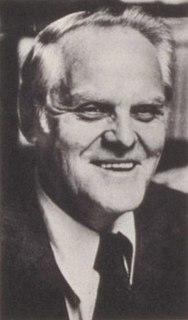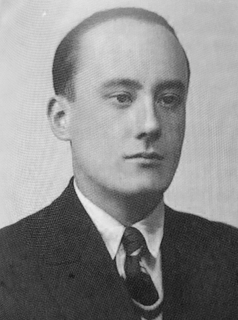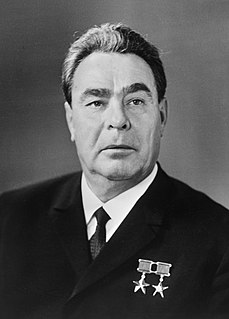A Quote by Leon Trotsky
The main task of Socialism - the organization of Socialist production - remains still in the future.
Quote Topics
Related Quotes
The society which we have built can in no way be termed "state socialism."The social organization which we have created can be termed a Soviet, socialist organization which has not yet been quite completed, but is in its root a socialist organization of society. The foundation of this society is public ownership.
On the world scene, it is our position that there is a resurgence of socialism taking place. The world's socialist and Communist forces are now on the move to restore socialism in the former socialist countries and to strengthen the existing socialist countries... there is a new socialist world on the horizon, a resurgence of the world revolutionary process.
For the overthrow of the bourgeoisie, the efforts of one country are sufficient - for this we have the testimony of the history of our revolution. For the definitive victory of Socialism, for the organization of Socialist production, the efforts of one country, especially of a peasant country like Russia, are insufficient - for that are required the efforts of the proletarians of several advanced countries.
In China the struggle to consolidate the socialist system, the struggle to decide whether socialism or capitalism will prevail, will still take a long historical period. However, we should all realize that the new system of socialism will unquestionably be consolidated. We can assuredly build a socialist state with modern industry, modern agriculture, and modern science and culture.
Capitalism and socialism are two distinct patterns of social organization. Private control of the means of production and public control are contradictory notions and not merely contrary notions. There is no such thing as a mixed economy, a system that would stand midway between capitalism and socialism.
Like most terms of political discourse, socialism has more or less, lost its meaning. Socialism used to mean something. If you go back far enough it meant basically control of production by producers, elimination of wage labor, democratization of all spheres of life; production, commerce, education, media, workers control of factories, community control of communities, and so on. That was socialism once. But it hasn't meant that for a hundred years. Socialism meant something different.
When external and internal forces hostile to the development of socialism try to turn the development of a given socialist country in the direction of the restoration of the capitalist system, when a threat arises to the cause of socialism in that country ... this is no longer merely a problem for that country's people, but a common problem, the concern of all socialist countries.
Hitler did not have Mussolini's revolutionary socialist background... Nevertheless, he shared the socialist hatred and contempt for the 'bourgeoisie' and 'capitalism' and exploited for his purposes the powerful socialist traditions of Germany. The adjectives 'socialist' and 'worker' in the official name of Hitler's party ('The Nationalist-Socialist German Workers' Party') had not merely propagandistic value... On one occasion, in the midst of World War II, Hitler even declared that 'basically National Socialism and Marxism are the same.'









































